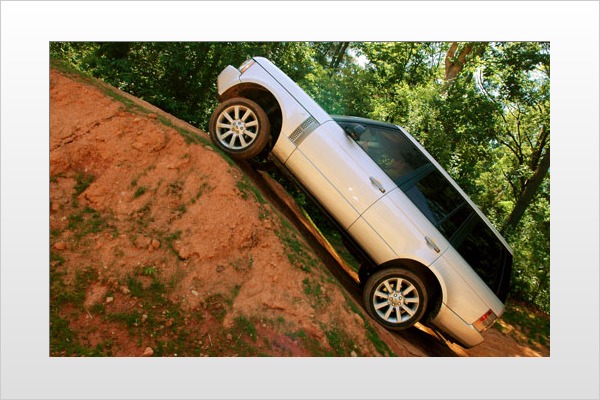
Off-road driving isn't about tearing across hill and dale to conquer lands unknown, and it's not just a male sport. I've discovered that off-roading is a deeply satisfying activity that helps you tune into yourself and the environment.
My trip started on a perfectly crisp winter day on the 8,000-acre grounds of the Biltmore Estate Inn in Asheville, North Carolina, home of the Land Rover Experience Driving School.
I was at the heated leather steering wheel of a $74,000 off-road vehicle, the 2007 Land Rover Range Rover, dropping head-on into a rocky, hip-deep stream. The vehicle tilted 33 degrees as we leaned sideways in a muddy ditch.
"It's fine," Lead Instructor Greg Nikolas said calmly. "Just turn your wheel hard and you'll lift right out of there." True. We did, but coming up fast was another stunt.
We began a slow crawl down a steep and dangerously slick decline, when Greg advised using an off-road skill that went against all of my instincts.
"The technique is counterintuitive," he explained. "Take your foot off the brake and the gas — yes, the brakes and the gas! Put the car in 1st and let it go!"
"Yeah, sure," I thought. This wasn't my first time in an off-road truck. I have shimmied up boulders in Moab, Utah, traversed black ice trails in Vermont and climbed over tree trunks in West Virginia. But this made me nervous.
I took a shallow breath, waiting for that off-road enthusiasm to kick in. I felt unhinged. Apparently, he noticed.
"You don't want to be scared," he coached. "If you're scared you won't process information correctly. Just trust and get into the Zen of the experience."
Meaning, slow down and practice moment-by-moment awareness during the task. I did my best, and it worked. I put my trust in the Range Rover's capabilities. Yes indeed, the wheels gripped, the gears kicked in and — instead of doing an imagined slow slide to hell — I eased down that decline at a steady and measured pace.
The more time I spent off-road driving in the woods that sunny afternoon, the more my mind entered into a meditative state. I actually slowed down my mind (and my heart rate) and appreciated the moment. It was all very clear — the sound of crisp branches crunching beneath the tires, the pungent smell of woods and mud, the feel of the damp, chilly air.
Protecting the environment
"For me, where the pavement ends is where adventure begins," noted photojournalist Sue Mead. Mead is one of the few established women journalists and experts in the field of off-roading. She competed in off-road races around the world, including Paris/Dakar and the Baja 1,000. When asked about her adventures around the globe, her whole being lights up.
"Zen is what I experience when I am in the wilderness," she said, adding, "It's also very Zen-like to protect our natural resources and be a responsible four-wheeler."
Many of Mead's off-road adventures were in a Land Rover, as the company is part founder of educational organization Tread Lightly!. Tread Lightly! aims to help balance enjoyment of the outdoors with the need to maintain a healthy environment. Its Guide for Responsible Four-Wheeling encourages four-wheelers to minimize their impact on the environment. Tips include: Yield the right of way to bikes, horses and hikers; keep noise and dust down; pack out what you pack in; stay on designated roads and trails or other areas open for use; avoid spooking livestock; and cross streams at fording points only.
The kinds of vehicles to take off-road
Mead noted that while the terms "off-road adventures" and "4WD" have become part of the popular lexicon, not every vehicle with 4WD is a good off-road vehicle. Most of today's SUVs, crossovers or light trucks have high ground clearance, low-end torque and tall tires that help them navigate mud-covered, snowy or rutty terrain. They'll get you to your country home — but not necessarily to the backcountry.
"Many consider towing a boat with a 2WD Chevy Suburban on a dirt road to be off-roading, and there are those who would consider the plethora of all-wheel-drive vehicles, like all Subaru models, or basic 4WD models, like the Lexus RX 330, capable of true four-wheeling. It isn't so," offered Mead.
Getting into wild lands that have rutted trails where obstacles such as fallen logs and large boulders are commonplace demands a capable off-road vehicle. These kinds of four-wheelers need more than 7 inches of ground clearance, a low-range set of gears (for better control and performance) and a traction control system or rear differential locks. While Jeep and Land Rover are the brands most associated with off-roading, there are other excellent off-road vehicles to consider. (See "Top 10 2006 4WD Vehicles for Off-Highway Use.")
How to prepare
Off-roading means you'll be off the beaten path, away from civilization. While exhilarating, it can also be dangerous if you're not prepared. Tread Lightly! offers the following tips to prepare for an off-road experience and keep adventurers safe.
Off-roading is more than just a test of confidence and a Zen-like experience. It allows people to forge deeper into remote areas for hiking, and it's a wonderful way to bond with family or friends on weekend camping trips. So go on out there, and when you do, bear in mind this Native American proverb:
"We did not inherit the Earth from our parents. We are borrowing it from our children."
For more information on trails visit:
Federal Recreation Areas and Activities
USDI Bureau of Land Management
National Park Service
U.S. Army Corps of Engineers